
La Verkin is a city in Washington County, Utah, United States. The population was 4,060 as of 2010, an increase from 3,392 in 2000. La Verkin is within walking distance of Hurricane, and the two cities have historically had close ties.
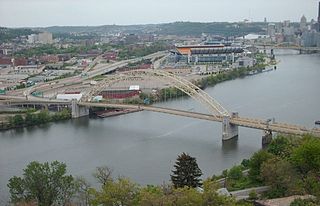
The West End Bridge is a steel tied-arch bridge over the Ohio River in Pittsburgh, Pennsylvania, approximately 1 mile (1.6 km) below the confluence of the Allegheny and Monongahela Rivers. It connects the West End to the Chateau neighborhood on the North Side of Pittsburgh.
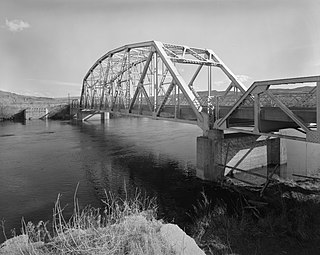
The CQA Four Mile Bridge spans the Big Horn River in Hot Springs County, Wyoming. The bridge was erected in 1927-28 by the Charles M. Smith Company and spans 175 feet (53 m) with a total length of 295 feet (90 m). The rigid 7-panel Pennsylvania through-truss was nominated for inclusion on the National Register of Historic Places as one of forty bridges throughout Wyoming that collectively illustrate steel truss construction, a technique of bridge design that has become obsolete since the mid-twentieth century. The bridge rests on concrete piers and abutments and is approached by two Warren pony trusses.

The St. Louis-San Francisco Overpass is a pony and deck truss bridge built in 1937 located in Imboden, Lawrence County, Arkansas. It carries U.S. Route 62 and Arkansas Highway 115 over the Spring River for 1,049.9 feet (320.0 m). The bridge has three Pratt deck trusses, each 112 feet (34 m) in length, and three Parker pony trusses, also 112 feet (34 m) long, with the balance of the bridge length in steel girder truss spans. The bridge is 24 feet (7.3 m) wide.
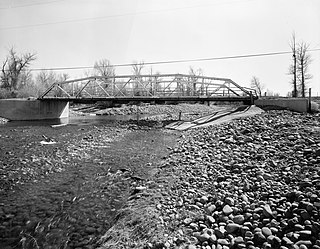
The ERT Bridge over Blacks Fork near Fort Bridger, Wyoming, was listed on the National Register of Historic Places in 1985 as part of a thematic study on early 20th century steel truss bridges in Wyoming. The ERT Bridge is a Warren pony truss bridge spanning 80 feet (24 m) with a width of 15.75 feet (4.80 m). Set on concrete abutments, the ERT Bridge was built around 1920 by Uinta County. It is an example of a transitional design from locally built bridges to standardized State designs
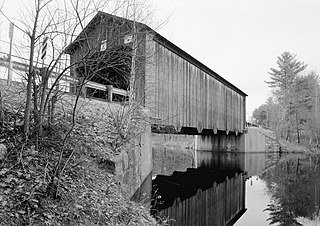
The Hancock–Greenfield Bridge is a historic covered bridge carrying Forest Road over the Contoocook River at the town line between Hancock and Greenfield, New Hampshire. The New Hampshire Department of Transportation covered bridge database refers to it as County Bridge. Built in 1937, it is the first wooden covered bridge in the northeastern United States to use modern engineering techniques. The bridge was listed on the National Register of Historic Places in 1981.
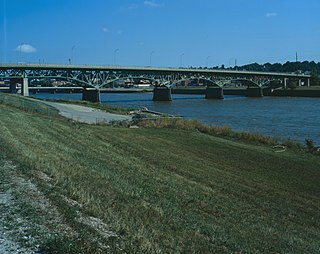
The Jefferson Street Viaduct is an historic structure located in Ottumwa, Iowa, United States. The riveted Warren deck truss bridge was completed in 1936. It was listed on the National Register of Historic Places in 1998 as a part of the Highway Bridges of Iowa MPS.
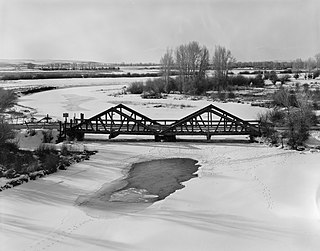
The DDZ Bridge over New Fork River is a Kingpost pony truss bridge located near Boulder, Wyoming, which carries Sublette County Road 136 across the New Fork River. The bridge was built in 1917 by Lincoln County's government, as Sublette County had not yet been formed. Unlike most truss bridges at the time, the bridge was built with timber trusses rather than steel; it is the only wooden two-span Kingpost truss bridge remaining in Wyoming. The bridge's construction is considered to be "the most sophisticated" of extant wooden truss bridges in the state.
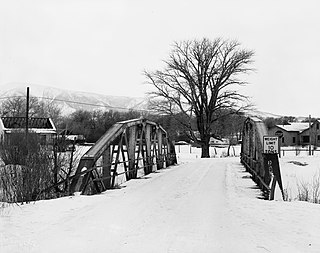
The DFU Elk Mountain Bridge was a Warren pony truss bridge located near Elk Mountain, Wyoming, which carried Carbon County Road 120-1 over the Medicine Bow River. The bridge was built in 1823 by contractor D. B. Miller. While the bridge's design is mainly a Warren truss, the top chord of the bridge is reminiscent of a Parker truss. At 102 feet (31 m) long, the bridge is the longest of its design in the Wyoming county highway system.

The EJZ Bridge over Shoshone River is a Warren pony truss bridge located near Lovell, Wyoming, which carries Big Horn County Road CN9-111 across the Shoshone River. Contractors McGuire and Blakeslee built the bridge from 1925 to 1926 using a design by the Wyoming Highway Department. The 389-foot-6-inch (118.72 m) bridge has four spans, the second-most of any truss bridge in Wyoming.
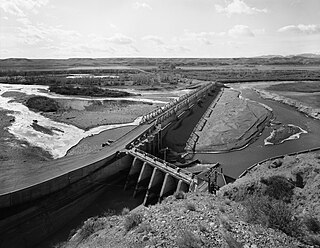
The ELY Wind River Diversion Dam Bridge is a Warren pony truss bridge located near Morton, Wyoming, which carries Fremont County Road CN10-24 across the Wind River. The bridge's structure is integrated with the Wind River Diversion Dam; it was the first truss bridge to be connected with a dam during its construction. The Taggart Construction Company built the bridge from 1924 to 1925. The bridge is 655 feet (200 m) long and has eight spans, making it both the longest road truss bridge in Wyoming and the road bridge with the most spans in the state.
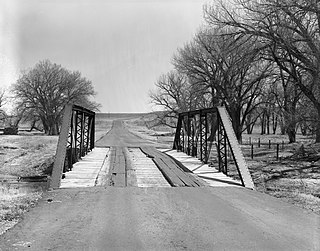
The EWZ Bridge over East Channel of Laramie River is a Pratt pony truss bridge that was located near Wheatland, Wyoming, which carried Platte County Road CN8-204 over the East Channel of the Laramie River. The bridge was built from 1913 to 1914 by the Pueblo Bridge Company. The single-span bridge was 71 feet 2 inches (21.69 m) long. The bridge's five-panel Pratt pony truss design with steel pin connections was used fairly frequently in Wyoming highway bridges, and the bridge was one of the older examples of the style.
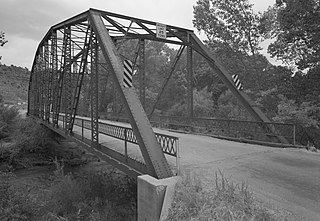
The Rockville Bridge spans the east fork of the Virgin River in Rockville, Utah, United States. The bridge was built for the National Park Service in 1924 to provide a link between Zion National Park and the North Rim area of Grand Canyon National Park. The new bridge allowed motorists to take a circular tour of the national parks in southern Utah and northern Arizona. The Rockville route was superseded in 1928 by the construction of the Zion-Mount Carmel Highway.

The Little Cossatot River Bridge is a historic bridge in rural Sevier County, Arkansas. It is located just west of Lockesburg, carrying County Road 139H over the Little Cossatot River. The bridge is a Warren pony truss structure, 70 feet (21 m) long, with 17-foot (5.2 m) approaches made of timber stringers. The trusses were built by the Morava Construction Company of Chicago, Illinois, and are believed to be the only of the company's trusses in the state. They feature a top chord that is a solid I-beam, which is connected by riveted plates to the bottom chord. The trusses are set on cylindrical concrete piers on either side of the river.
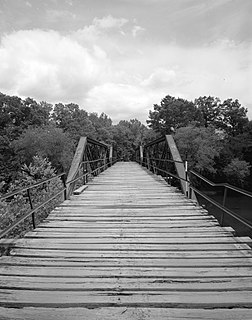
The Mountain Fork Bridge is a historic bridge in rural Polk County, Arkansas. It carries County Road 38 across Mountain Fork Creek north of Hatfield and southwest of Mena. The bridge consists of two spans of steel Pratt pony trusses, with a total length of 406 feet (124 m), including approach spans. The trusses are set on piers consisting of steel rings filled with concrete; each of these spans is 80 feet (24 m) long. The bridge's construction date and builder are unknown; it predates the standardization of bridge designs in the state in 1923. It is estimated to date to the early 1900s.

The Hondo River Bridge was a historic bridge over the Hondo River in Comerío municipality, Puerto Rico. As of 1995, it was the oldest bridge truss in Puerto Rico, employing a double Warren pony truss design and unique open web transverse joists. It was originally installed in 1881 as one of three spans of the Reyes Católicos Bridge over the Plata River on the San Juan–Mayagüez road, using metal parts fabricated in Belgium. After a hurricane destroyed one of the other spans of the Reyes Católicos Bridge in 1899, this surviving span was moved and re-installed on new abutments under the supervision of engineer Rafael Nones in 1908, as part of the Comerío–Barranquitas road. It was finally removed and replaced in 2001.

The Lover's Lane Bridge is a historic bridge spanning the Dog River in Berlin, Vermont. Built in 1915, it is a rare early 20th-century example of a Warren pony truss bridge. It was listed on the National Register of Historic Places in 2006 as Bridge No. 27.

The New Hampton Pony Pratt Truss Bridge is a historic pony Pratt truss bridge on Shoddy Mill Road in New Hampton of Lebanon Township, Hunterdon County, New Jersey. It crosses the Musconetcong River between Lebanon Township, Hunterdon County and Washington Township, Warren County. It was designed by Francis C. Lowthorp and built in 1868 by William Cowin of Lambertville, New Jersey. The bridge was added to the National Register of Historic Places on July 26, 1977 for its significance in engineering, industry and transportation. It is one of the few early examples of iron Pratt truss bridges remaining in the United States. It was later documented by the Historic American Engineering Record in 1991. It was added as a contributing property to the New Hampton Historic District on April 6, 1998.

The Main Street Bridge, once known as the West Main Street Bridge, is a historic pony Pratt truss bridge crossing the South Branch Raritan River in Clinton of Hunterdon County, New Jersey. It was designed by Francis C. Lowthorp and built in 1870 by William Cowin of Lambertville. The bridge was added to the National Register of Historic Places on September 28, 1995 as part of the Clinton Historic District. It is one of the few early examples of iron Pratt truss bridges remaining in the United States. It was documented by the Historic American Engineering Record in 1991.

The Glen Gardner Pony Pratt Truss Bridge is a historic pony Pratt truss bridge on School Street crossing the Spruce Run in Glen Gardner of Hunterdon County, New Jersey. It was designed by Francis C. Lowthorp and built in 1870 by William Cowin of Lambertville, New Jersey. The bridge was added to the National Register of Historic Places on September 22, 1977 for its significance in engineering, industry and transportation. It is one of the few early examples of iron Pratt truss bridges remaining in the United States. It was later documented by the Historic American Engineering Record in 1991.

























